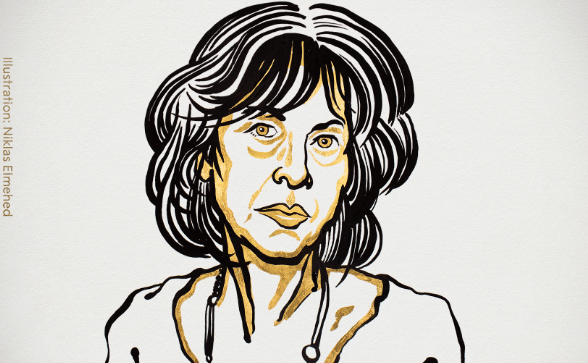Stockholm: American poet Louise Gl ck won the Nobel Prize in Literature on Thursday for her candid and uncompromising work, which looks unflinchingly and with biting humour at the losses and traumas of family life.
She joins a handful of American poets who have received the prize, which has been dominated by novelists throughout its 112-year history. The last American to win was Bob Dylan in 2016.
She is also one of the few women the 16th female Nobel Literature laureate.
The Nobel Committee praised Gl ck for her unmistakable poetic voice that with austere beauty makes individual existence universal in the citation read during the announcement in Stockholm by Mats Malm, the permanent secretary of the Swedish Academy.
New York-born Gl ck, 77, who is a faculty member at Yale University, made her debut in 1968 with Firstborn, and was soon acclaimed as one of the most prominent poets in American contemporary literature, the committee said.
Anders Olsson, chairman of the Nobel literature committee, said Gl ck’s 12 collections of poetry were characterized by striving for clarity.
They include Descending Figure, The Triumph of Achilles and Ararat. Olsson said her verses, which often draw on classical influences and examine family life, were marked by an “austere but also playful intelligence and a refined sense of composition.
Raised in a family with Hungarian Jewish origins, Gl ck has spoken of how a teenage struggle with anorexia, and the therapy she received for it, influenced her incisive writing.
Louise Gl ck’s voice is unmistakable. It is candid and uncompromising, and it signals that this poet wants to be understood. But it is also voice full of humor and biting wit, Olsson said.
This is a great resource when Gl ck treats one of our great topics, radical change, where the leap forward is made from a deep sense of loss. The committee noted her 2006 collection Averno, calling it masterly and a visionary interpretation of the myth of Persephone’s descent into hell in the captivity of Hades, the god of death.
Gl ck is the recipient of many awards, including Guggenheim and National Endowment for the Arts fellowships, the American Academy of Arts and Letters Gold Medal in Poetry and the National Humanities Medal.
She won the Pulitzer Prize in 1993 for The Wild Iris and the National Book Award for Faithful and Virtuous Night in 2014. She was US poet laureate from 2003 to 2004.
The Nobel Prize, which includes a 10 million kronor (more than 1.1 million) prize, comes after several years of controversy and scandal for the organization that awards the literary accolade.
In 2018, the award was postponed after sex abuse allegations rocked the Swedish Academy, which designates the committee that chooses the literature winners, and sparked a mass exodus of members.
After the academy revamped itself in a bid to regain the trust of the Nobel Foundation, two laureates were named last year, with the 2018 prize going to Poland’s Olga Tokarczuk and the 2019 award to Austria’s Peter Handke.
But Handke’s prize caused a storm of protest: A strong supporter of the Serbs during the 1990s Balkan wars, he has been called an apologist for Serbian war crimes. Several countries including Albania, Bosnia and Turkey boycotted the Nobel awards ceremony in protest, and a member of the committee that nominates candidates for the literature prize resigned.
On Monday, the Nobel Committee awarded the prize for physiology and medicine for discovering the liver-ravaging hepatitis C virus. Tuesday’s prize for physics honored breakthroughs in understanding the mysteries of black holes, and the chemistry prize on Wednesday went to scientists behind a powerful gene-editing tool.
Still to come are prizes for outstanding work in the fields of peace and economics.
Also read: Why 2020 Chemistry Nobel went to CRISPR-Cas9 tool that can ‘rewrite code of life’






